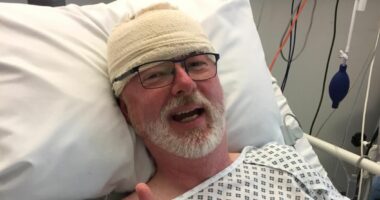Share this @internewscast.com
Health authorities are set to remove the cautionary labels that currently warn of dementia and cancer on hormone-replacement therapy (HRT) medications prescribed to women.
On Monday, the US Department of Health and Human Services (HHS) revealed that the Food and Drug Administration (FDA) is working towards eliminating the ‘black box’ warnings that accompany HRT drugs, which are commonly used to address menopause symptoms.
Hormone replacement therapy involves supplementing hormones like estrogen and progesterone, which naturally decrease in the body over time. Menopause typically begins around age 51, marking a period when a woman’s egg production slows, leading to a decline in estrogen levels.
The reduction in estrogen is responsible for common menopause symptoms such as hot flashes, vaginal dryness, bladder issues, and decreased libido.
HRT is effective in restoring estrogen levels and mitigating these symptoms. Despite its benefits, only one in 20 women in the United States currently receive this treatment.
This figure has significantly dropped from approximately 27 percent in the late 1990s. The decline began in the early 2000s after the FDA placed black box warnings on HRT drugs, signaling its most severe health caution.
FDA Commissioner Dr Marty Makary said Monday the agency is working to remove language on the product labels referencing risks of heart disease, breast cancer and dementia to encourage greater HRT use among menopausal women.
The agency believes benefits of lower heart attack risk, reduction in cognitive decline and lower Alzheimer’s disease risk outweigh potential harms.

Health officials in the US will remove black box warning labels for hormone replacement therapy in menopausal women (stock image)
HHS Secretary Robert F Kennedy Jr said Monday: ‘Today, we are standing up for every woman who has symptoms of menopause and is looking to know her options and receive potentially life-changing treatment.
‘For more than two decades, bad science and bureaucratic inertia have resulted in women and physicians having an incomplete view of HRT. We are returning to evidence-based medicine and giving women control over their health again.’
In 2002, a study from the Women’s Health Initiative found HRT led to a slightly increased risk of developing breast cancer. HRT use for menopause dropped drastically after despite initially being popularized in the 1960s.
Within six months, HRT use dropped nearly 50 percent.
Dr Makary said: ‘Tragically, tens of millions of women have been denied the life-changing and long-term health benefits of hormone replacement therapy because of a medical dogma rooted in a distortion of risk.
‘For too long, issues of women’s health have been underrecognized. Women and their physicians should make decisions based on data, not fear.’
However, women in the study were 63 years old on average, over a decade older than the typical menopause age of onset, and the hormone formulation they were given is no longer in use.

Menopause in US women starts around age 51 on average. The FDA now recommends HRT within 10 years or menopause onset or before age 60 (stock image)
Follow-up research in the years to come argued against the 2002 study, concluding women in the study were already at an age where they were more vulnerable to heart disease and cancer.
Modern research suggests opposite effects. The FDA pointed to studies that found HRT use within 10 years of menopause, or before age 60, reduced heart disease risk by 50 percent, Alzheimer’s disease likelihood by 35 percent and bone fractures by 50 to 60 percent.
The FDA said it will now recommend starting HRT within 10 years of menopause onset or before the age of 60 based on an expert panel’s review of the science in July.
Dr Alicia Jackson, Advanced Research Projects Agency for Health director, said: ‘Estrogen is a key hormone for women’s health. Every single part of a woman’s body depends on estrogen to operate at its best—including the brain, bones, heart, and muscles.
‘The removal of the black box warning, based on the best science and data, is an incredible step forward to empower millions of women to live longer, healthier lives.’
















